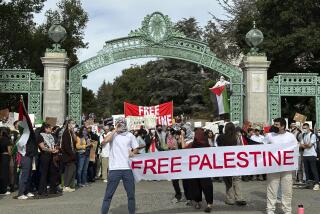A community has taken shape at Israeli protesters’ tent city
The camp has grown so big that it needs addresses. Debates are held at No. 199 Tent Blvd.
Haircuts are on the house at Benny Zeevi’s flower-decked tent, where the motto is “Life is beautiful, love will prevail.”
There’s even newspaper delivery, including a pile of financial papers plunked down on the sidewalk next to a tent with a “People Before Profits” sign.
Part Woodstock, part boot camp, Tel Aviv’s burgeoning protest encampment has become a small-scale experiment in a utopian society and a challenge to the established social order.
A few weeks ago, the residents were strangers demonstrating against high housing costs in a country where prices for apartments have gone up 55% and rents 27% in five years. Now the tent city inhabitants are comrades in a cause. A single-issue protest has broadened into a younger generation’s demands for social justice and a fairer distribution of Israel’s resources.
“It started as a housing protest, but now it’s far wider,” said Adi Peled, a 30-year-old special education teacher. “Now there’s a unity in the air, a shared cause and common denominator that’s been missing from our alienated society.”
The housing crisis was a symptom, people said, of middle-class and young Israelis’ suffering despite the country’s booming economy. In a reverse image of the “tea party” movement in the United States, many Israelis are clamoring for more government involvement in the economy and greater redistribution of income. They say the government’s sell-off of state-owned companies and services in recent decades went too far and left people defenseless against the whims of the free market.
“The people demand social justice!” is the battle cry of a protest that started with a few tents on a street corner in mid-July and has since spread across the country. It has gotten the attention of Prime Minister Benjamin Netanyahu, who has pledged reforms and set up teams to address the protesters’ demands for free education beginning at the age of 3 months and housing help.
Along the way, the Tel Aviv camp has grown into a functioning community.
It has democratically elected representatives and nightly debates far more orderly than those in Israel’s parliament. There’s no heckling, no talking out of turn and a set of agreed gestures borrowed from sign language to signal speakers when people agree, disagree or have had enough of a particular topic.
If people need a break from lofty debate, they can visit the library, a long table piled with newspapers and books. In the play area, children can have fun with Mr. Potato Head toys or puzzles or snooze on the mat.
For nighttime intellectual stimulation, the camp features guest lectures (Tuesday’s topic was “socialism and liberalism”) and free stage performances by local theater troupes and musicians.
In normal times, Rothschild Boulevard is one of Tel Aviv’s trendiest, shaded by giant ficus trees and dotted with parks and cafes. Now a colorful encampment of 400 tents and hundreds of people has spread along much of the mile-long street named for the Zionist philanthropist Baron Edmond Benjamin James de Rothschild, who no doubt would approve of the spirit of giving that’s in the air.
The tents are mostly standard camping gear, but what they lack in style, they make up in flair. They have been decorated, painted, splashed with graffiti (“A revolution of love,” “I sold my tent to pay the rent”).
Residents range from their early 20s to mid-30s and represent a breed of broadband beatniks with as many laptops as guitars.
Compulsory military service has given most Israelis survival skills and a knack for mobilization, along with a sense of mutual responsibility and the ability to function in a group.
An army marches on its stomach, and so do protesters. At the tent city’s central kitchen, volunteers prepare four meals a day (including a midnight spread). Four generator-run refrigerators keep food from spoiling. Strict sanitary guidelines are in force: wash hands with soap, no bare chests and absolutely no smoking around food.
There’s no mistaking the smell of the compost bin; naturally, they recycle.
A motorcycle honks from the street, signaling Peled, the camp’s kitchen manager. She returns with goodies from a nearby hummus joint, a timely contribution for lunch. Someone has written “revolution!” all over the plastic bag in green marker.
“This is wonderful! This stuff happens all the time,” she says, smiling.
Some of the protesters’ demands have their roots in Israel’s early days, when “solidarity and socialism didn’t used to be dirty words,” said Hava, an older Tel Aviv resident who didn’t want her last name published. She observed the scene while resting on a bench, her face flushed from summer heat and humidity so brutal that campers were handing out blue-and-red popsicles up and down the boulevard.
“If they can get these [values] back, more power to them,” she said.
Shay Kenigsberg and Karmit Yshc sat in a kind of open-air living room between tents and explained the causes of the protest. They said they each juggles a few jobs and still can’t make ends meet.
“We’re here because we want to live. We served in the army, we work hard and want to move on to the next stage in life, but it’s not happening because tycoons are taking our money,” said Yshc, 29, a bartender from the northern city of Haifa.
“Most citizens aren’t living the life they deserve,” said Kenigsberg, a 30-year-old screenwriter. “The country has money but the social order and politicians keep it from most of the public. It’s time for a new social order and new priorities.”
The mayor of a northern town enraged the protesters by mocking them as a spoiled bunch with a taste for hookah pipes and sushi.
“Then why are we offering better solutions than those we pay millions to do their jobs?” Kenigsberg asked.
Yshc frowned at an allusion to Woodstock, but then reconsidered. “Woodstock made a real difference too,” she said.
It’s hard to tell what’s hotter, the weather or the endless debates along the boulevard.
Yshc and Kenigsberg take turns spritzing themselves with water. They avoid hot-button issues such as security and Jewish settlements in the West Bank. On such issues, Kenigsberg is left, Yshc is right, yet they agree on the camp protest’s goals.
Kenigsberg said this could be “the real revolution” that will shift Israeli politics away from security and diplomatic questions and toward a domestic social agenda.
It isn’t about right or left, Kenigsberg said. “Religious, ultra-Orthodox and settlers too should all be here. This is everyone’s fight.”
For now, the protesters enjoy wide public support, and officials have taken no steps to crack down on the encampment. The Tel Aviv municipality collects the garbage four times a day, inspects the electrical wiring and has the boulevard swept round-the-clock.
Owners of the cafes along the boulevard should be happy: The area is jampacked with Israeli tourists here to see the spectacle. One source of tension is a shortage of portable toilets. Some campers have relieved themselves in neighbors’ yards.
With Israel’s fast-paced news cycle, it is hard to predict how long the protest will command the nation’s attention. The movement could lose steam when school resumes next month. The Palestinian Authority’s plans to seek recognition for a Palestinian state at the United Nations next month also could take away the headlines.
This struggle is part class and part ideological and also generational. Young Israelis resent being described as shallow or self-absorbed. Avia Cohen, who runs the media and Internet team at a sister encampment in Jerusalem, said, “We pick up 15 channels simultaneously while the older generation sees things in mono.”
He too looks back to Israel’s feisty socialist founders, who “handed the nation to the next generation on a silver platter, only for them to sell it.”
“Our generation is here to reclaim it.”
Sobelman is a news assistant in The Times’ Jerusalem bureau.
More to Read
Start your day right
Sign up for Essential California for news, features and recommendations from the L.A. Times and beyond in your inbox six days a week.
You may occasionally receive promotional content from the Los Angeles Times.






